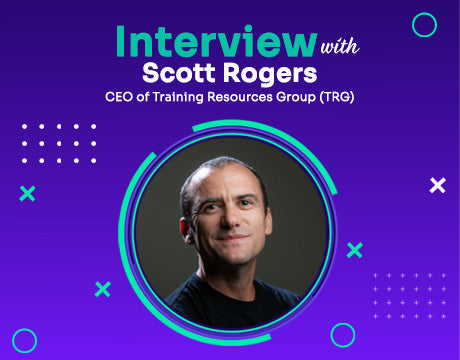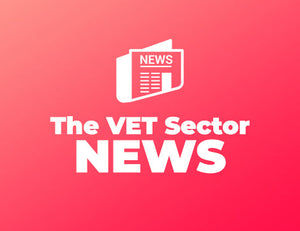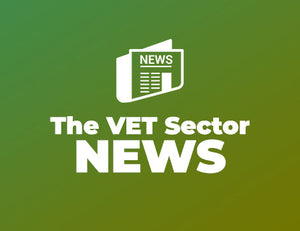
Interview with Scott Rogers - CEO of Training Resources Group (TRG)
SUKH SANDHUBIO
Scott Rogers has been involved in Vocational Education and Training for over 15 years. He has fulfilled the role of CEO of three RTOs for ten years and is currently the CEO of Training Resources Group (TRG), comprised of the following companies:
- TotalVET Training Resources,
- Compliant Learning Resources,
- Precision RTO Resources
- eSkilled Student and Learning Management Systems.
Scott has seen many changes in the industry during his career, and has a wealth of knowledge in:
- Corporate Governance, Risk Management, ,
- Quality Assurance and Validation
- RTO Management
- Compliance Audits
- Assessment Tool and Training Resource Development
In this interview, Scott shares his insights on the current state of vocational education and training, the challenges facing the industry, and the innovations that he sees happening in the future.
How have your companies been involved in vocational education and training?
It has been an interesting journey for me. Delivering training and assessment as CEO of three RTOs I quickly became aware that there were no “off the shelf” training resources we could rely on to meet unit requirements, student needs and deliver quality training and assessment outcomes. The resources available did not adequately assess skills and failed to provide students with the information and opportunity to practise those skills to achieve competency. As a result, we decided to develop our own resources, a costly and time consuming choice, however one we do not regret. Further discussions with a number of RTO CEOs facing the same problem, lead to the launch Compliant Learning Resources.
We understood that it was not viable for most RTOs to develop resources to the standard required, so decided to create an unlimited licensing model so RTOs could access cost effective quality resources. Over time we have acquired and transformed other resource publishers to lift the quality of resources across many training package areas, with a focus to provide quality resources in most training package areas. We also partner with quality publishers to deliver resources in areas we cannot service.
Our moto is “changing lives through quality training resources”, and we take this responsibility very seriously. There is just too much risk for RTOs in running with the invalid, insufficient training and assessment tools. Our goal has always been to remedy the lack of quality resources available for RTOs and we are achieving that as a preferred resource supplier to thousands of RTOs across Australia.
What are some of the challenges you've seen in the industry?
I would say the two biggest challenges have been the Pandemic, and the transition to ASQA (who had a mandate to clean up the industry). Whilst the sector needed to eradicate unscrupulous RTOs, unfortunately ASQA took a shotgun approach to regulation and acted with very little due diligence and governance when it came to quality auditing. This saw many good RTOs facing extreme and unnecessary regulatory action, with many great RTO owners leaving the sector due to the uncertainty and unnecessary risk associated with a “regulator on the warpath”.
The great news is that there has been considerable reform of ASQA under Saxon Rice and we are finally seeing a more educative and supportive regulator. Saying that, there is still room for improvement in audit consistency.
What do you think is needed to improve vocational education and training?
The Standard for RTOs. We are obviously going through a reform of the standards right now, which is welcomed, and well overdue in my opinion.
The trouble with the current standards is that they have not been aligned to our current training packages. Streamlining units of competence saw major reform to how training packages are written and structured, however the rules of evidence and principles of assessment were never revised adequately to ensure they align to the new unit structure. This has resulted in a huge amount of inconsistent audit judgements, as the principles of assessment and rules of evidence often conflict with the unit requirements. A good example of this is that units now state the number of times that a requirement must be demonstrated, however, the principles of evidence state:
“assessment to be based on evidence that demonstrates that a student could demonstrate these skills and knowledge in other similar situations”.
I have seen this interpreted by ASQA auditors (on numerous occasions) as requiring the candidate to have completed the same task more than once in different contexts, and giving the RTO a non-compliance. When in fact, the unit only requires the same task to be performed once. These kinds of inconsistent decisions damage RTO reputations and the overall reputation of VET. We need to get the Standards much more clearly defined and unfortunately it looks like the latest drafts have repeated a lot of the same problems with clear and specific standards.
What are some of the innovations you've seen in vocational education and training?
Every time I get an opportunity trial Virtual Reality (VR) I get excited about the possibilities. I think VR is for simulating high risk tasks, to allow students to practise skilled in a safe environment, before taking on those tasks in the real world. I recently had a go on a VR welding training and assessment activity and was really amazed at how effective it was. Of course it didn’t think I was great at welding. There is so much potential for VR to simulate many of our high risk job areas to create safe, effective training and assessment.
The pandemic created real challenges for RTOs and particularly those heavy practical skills-based industries, reliant on face to face delivery. It was amazing to see RTOs rise to the challenge by implementing incredible online delivery, using all the technology available to them. Filling the gap of face to face with “How To” Videos, Virtual Classes with breakout sessions, eLearning Tutorials allowed students to keep learning amidst a very uncertain time. Of course we can never completely replace the practical “hands-on” tasks (e.g. changing a tyre), with technology, however we certainly can use it to provide all the underlying knowledge, so students can focus on the practical when they get into the workplace or classroom.
Interestingly, I have noticed that many RTOs have maintained a lot of these new innovations post pandemic, as they have experienced the benefits of providing flexible delivery options to meet different learn needs.
How your companies support innovation in vocational education and training?
eSkilled LMS and SMS continue to evolve and we are really excited to have launched one of the most innovative Online Assessment Activity (OLA) builders in July this year! We call this exciting new online assessment builder OLA. We have entered OLA into the LearnX awards and recently found we have been nominated for the Innovation in LMS award. We eagerly await the final results due out soon. A summary of how OLA can transform assessment in VET is below.
OLA is designed for VET and allows RTOs to completely eradicate paper and document based assessment with the following innovations:
- Assessments can be completed anywhere, anytime on any device
- Visual Drag and Drop Assessment Form Builder to easily create:
- Workplace Based Assessment
- Third Party Reports and observation forms with digital signatures
- Workplace logbooks
- Workplace forms
- Online Task Based Assessments:
- Assignment, simulated case studies and project-based assessments
- Create short answer and essay type questions
- Realtime Video Capture from any device webcam: Students capture themselves completing tasks. No more travel for workplaces observations.
- Digital Observation Forms that can be completed from any device: Assessors can complete observation form while observing video or real world assessment task.
- Meet VET National Regulatory Compliance Requirements for Online Assessment by:
- Using Digital Signatures with date and time stamp to replace need for signed documents and remove barriers for learners assessors and supervisors.
- Tracking Completion Time to meet “Amount of Training” requirements
- Using image capture technology to take webcam photos of students actually completing their assessment to meet Authenticity requirements.
- Streamline Student Assessment Completion: with assessments completed online removing barriers to completion.
- Reduce Marking Time for Assessors with embedded marking guides below each answer field that only assessors can see.
- Export to PDF OR WORD: One click to convert the online assessment to Word or PDF. It will automatically compile the table of contents from the form headings for easy document navigation.
What do you think is the future of vocational education and training in Australia and overseas?
We need to keep evolving and stepping up to meet the challenge of the current skill crisis Australia faces. Australia has critical skills shortages in many areas right now and we need RTOs to act on these opportunities to deliver competent people to the workforce. It is a great time for VET with the federal Government finally starting to address VISA delays and providing solid funding in the latest budget. RTOs really need to think strategically around how they can meet the needs for VET both in Australia and overseas.
What do you think is needed to improve vocational education and training in the future?
We definitely need to get the focus back to quality TRAINING. The problem with having an aggressive Regulator, is that focus has been on compliant assessment, and not enough focus on delivering incredible training. We need RTOs to provide learners with engaging training that allow them to practise and hone their skills and doesn’t just focus on getting them through in the shortest amount of time. Too often we see RTOs just wanting everything to be as easy for learners as possible, with nowhere near enough focus on ensuring that those students are going the required skilled to be a effective (competent) and productive employee. I would really love to see the focus come back to training. We need to get away from focusing on ticking boxes.
How can we make sure that vocational education and training is accessible to everyone?
I think that there is a bit of work to do here. Many RTOs do not consider students living with disabilities or LLND difficulties, when developing and designing their course content or choosing the LMS platforms. There are many things we can do to support all learners to participate in our learning journeys. Just a few things off the top of my head are:
- Go beyond just having an inclusivity and diversity policy and turn that into an inclusivity and diversity CULTURE by putting it into practise in all aspects of training and support
- Consider font size when designing materials, or use an LMS application that will allow the learner to change text size
- Make sure our venues and campuses are friendly to those living with disabilities
- Use technology to narrate text for those with LLN challenges or hearing impairments





